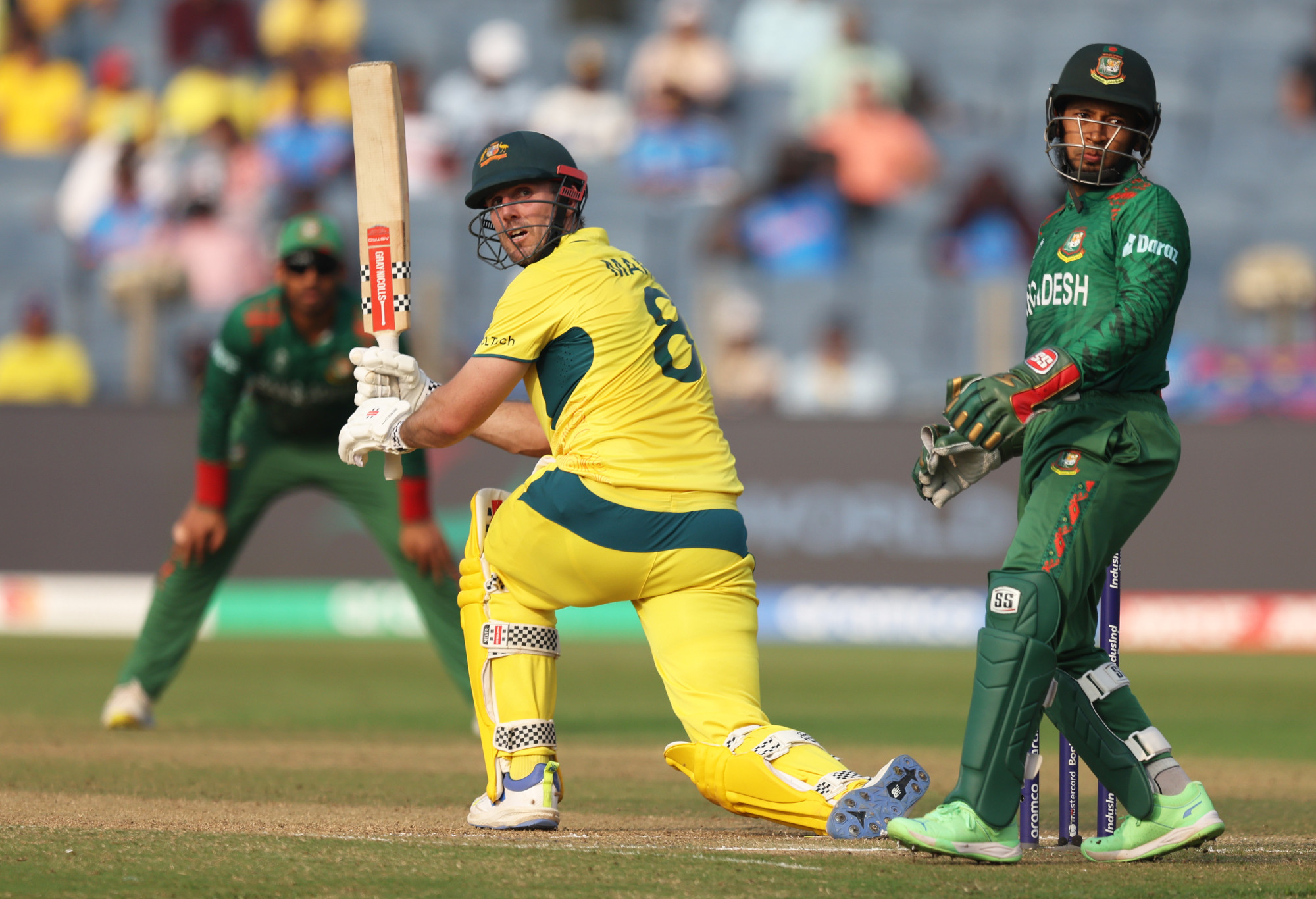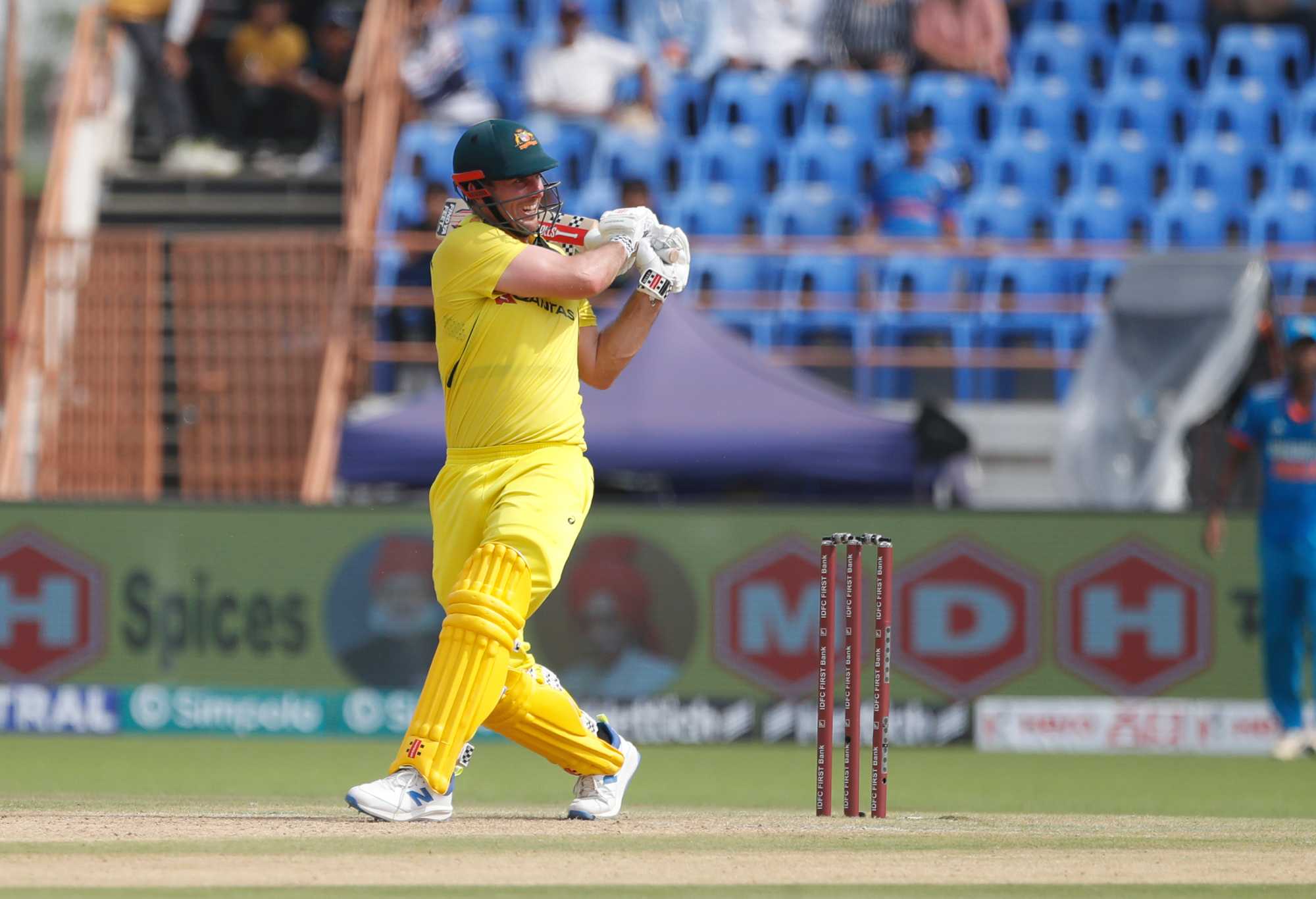Are India selecting themselves out of T20 World Cup glory?
Insanity is doing the same thing repeatedly and expecting different results. This quote is often attributed to Albert Einstein, but nobody knows if he…
The first ball that Mitchell Marsh faces from Glenn Phillips is a full toss. It leaves the hand and seems to float in mid-air. It is not so much asking to be hit as begging, “Please sir, can I have some more?” More of the pummelling that Marsh has spent the last hour watching David Warner and Travis Head dish out to better balls than this looped-up offering.
As the ball approaches Marsh’s swinging arc, which is the size of an above-average sized ballroom, the crowd waits for him to send it flying over the Himalayas. At that precise moment, there is nothing more certain than the fact this ball is coming back to Phillips with a dusting of early-season snow on it. Because that is what Mitch Marsh does. He marmalises cricket balls for a living.
But not this time.
This time he merely props forward and dead bats the ball to short midwicket. It’s barely rolling as the fielder picks it up and tosses it back to Phillips. Phillips smiles, the smile of a man who knows the shot-limiting strictures of time.

Mitch Marsh batting against Bangladesh. (Photo by Matthew Lewis-ICC/ICC via Getty Images)
Before a ball was even bowled in this World Cup, pundits were signing the death certificate of one day cricket. And who could blame them? The rise of the Meaningless One Day International (the MODI) had taken on plague proportions. They had become skirmishes without context, played out by fringe players, wedged between proper matches like a palate-cleansing lemon sorbet served between plates at a five-course degustation.
The MODIs didn’t cleanse the palate, though. They left a sour aftertaste, merely serving as evidence of the contempt with which cricket administrators held the 50-over game. But those who rushed to search for the pulse of the one-day game and declare it dead were confusing the game with the scheduling of the game.
While the scheduling may have become a mess, the game itself remains a thing of beauty.
You cannot discuss the alleged death of one-day cricket and not mention the Frankenstein-like rise of T20 cricket. In developing T20 cricket, administrators created cricket for people who don’t like cricket. The logic is Orwellian, the tragedy Shakespearean. Many who already liked cricket did not like this new cricket. For, like Dr. Frankenstein’s creation, something was missing.
T20 cricket is cricket with time removed. It is an attempt to reduce cricket to its essence. But as a concept it fails, and it fails because time itself – slow, meandering, inevitable – and the futility of our human response to the passing of time, is the essence of cricket.
You can reduce a Japanese tea ceremony to a shot of tea, a 120-minute romcom to a 3-minute clip or an ascent of Everest to a helicopter ride to the top. You still get the tea, you still get the girl-meets-boy and you still get the view from Everest, but the experience is meaningless if there is no accompanying narrative, if there is no context. Narrative and context – and meaning – can only manifest with time.
The knockers will tell you we don’t have time any more for one-day internationals. I say time is all we have. The knockers say that the time from the 11th to the 40th of overs is killing one-day cricket. I say that those overs are where the beauty of cricket resides.

Mitchell Marsh. (Photo by Pankaj Nangia/Getty Images)
They are the overs that contain the space to think, for both the observer and the participant. The participant wonders when is the right time to accelerate, to pull back, what’s a good score, can they force the death bowler back early, will the pitch deteriorate, if they fail now will they ever play again?
Or if you are Mitch Marsh in Dharamshala, overs 11 to 40 give you the time to wonder how to follow the Head and Warner blitz, to ponder how long you’ve already sat in the shed.
You ruminate on how slow the overs will pass if you are to watch the rest of the innings from the sidelines, while simultaneously noting how quickly the dot balls are stacking up against your name on the giant scoreboard that beams down at you like big brother, all knowing, all judging.
If you are Mitch Marsh in Dharamshala, time freezes you, floods you with doubt, makes you look down at your own Herculean forearms and wonder why they are not capable of propelling the ball further than short cover.
For the observer, overs 11 to 40 give you the time to make the pot of tea, to text a friend at 2am to ask if they’re watching too as you recall the ’99 semi final against South Africa and confuse it with the final game of the Super Sixes. It is the time you question whether it’s worth pushing through the night knowing that we’ll probably collapse and lose. It is also the time you tally your remaining sick days because something special might happen and you have already invested six hours into game 13 of 45 of this never-ending World Cup.

New Zealand’s Matt Henry appeals for LBW against Afghanistan. (Photo by Alex Davidson-ICC/ICC via Getty Images)
And if you are watching Mitch Marsh in Dharamshala, it is the time you start to wonder how the physique of a bison and the timidity of a mouse can be combined within one human. You know that in this over, or the next, or the one after, something is going to give – he’s going to stick or twist, turn or burn, and you hang in there because you deserve to see it. You’ve earnt the right, dammit.
And then he’s gone, 31 off 56, and it feels like you’ve caught your best friend in bed with your wife. On your wedding day. And as he trudges off, each heavy step seeming to shake the stadium, Marsh embodies the same disappointment. He returns to the dressing rooms with all the time in the world to think about what just happened.
A few games later at Pune, as another ball sails into the crowd, Mitch Marsh looks down at his bulging forearms and remembers what they’re for. We spend 132 balls with him in Pune (twelve more than a completed T20 innings) and feel intimately connected with his 177no. It means more than just a thrashing of boundaries against an attack as threatening as a warm bath.
It means something to Marsh, and it means something to us. Because in those 56 balls in Dharamshala, we came to know Mitch Marsh a little more. His struggle is our struggle. And we came to know him through nothing more than time spent with him, time that only the one-day game can give us.